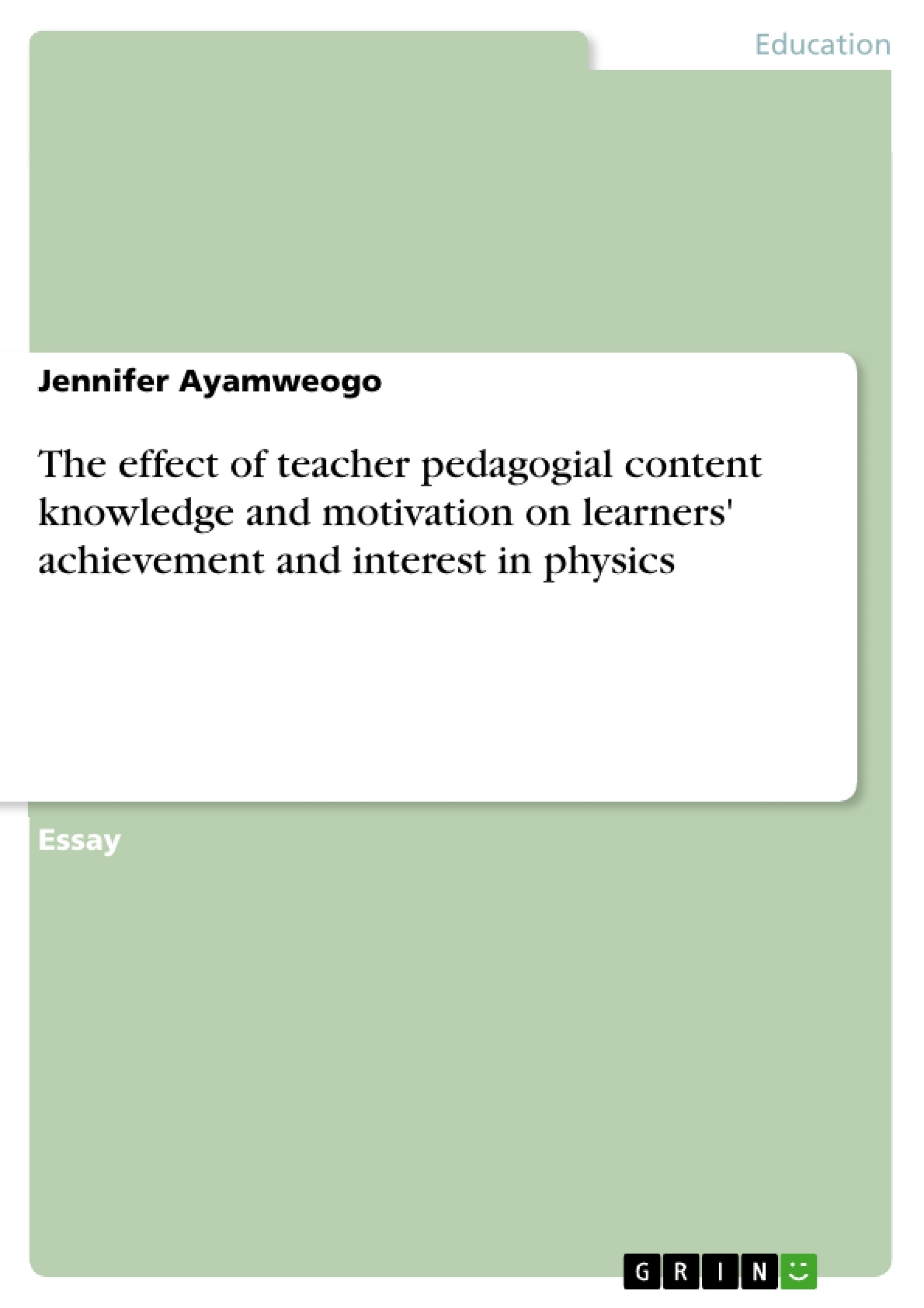This study investigates students' interest and achievement as well as how much teacher motivation and expertise predicts these things. It is thought that both student engagement and achievement are desirable results of classroom learning. Previous study has shown that teacher motivation is a key element impacting students' engagement, while teacher pedagogical content knowledge has been recognized as a strong predictor of student accomplishment. Until date, nevertheless, the majority of research has either examined knowledge or motivation (from both the teacher's and the students' perspective); it has seldom looked at both at the same time or examined the instructional mechanisms that are thought to enhance the alleged benefits of teacher motivation and knowledge. Using a multi-method approach to combine data from test instruments (teacher pedagogical content knowledge, student achievement), questionnaires (teacher motivation, student interest, student perceived enthusiastic teaching), and videotaped instruction (cognitive activation rated by observers), this study examines 48 physics teachers and their classes in Upper East and Upper West region of Ghana. The hypothesis that teacher pedagogical subject knowledge positively predicted students' achievement was supported by multi-level structural equation modeling; cognitive activation acted as a mediating factor in this relationship.
Inhaltsverzeichnis (Table of Contents)
- ABSTRACT
- BACKGROUND
- Physics Education
- The Crucial Role of Physics in STEM Fields
- The Need for a Strong Foundation in Physics for Scientific Literacy
- LITERATURE REVIEW
- Teacher Motivation
- Teacher Pedagogical Content Knowledge
- Students' Interest and Achievement
- METHODOLOGY
- Research Design
- Participants
- Instruments
- Data Collection Procedures
- Data Analysis
- RESULTS
- DISCUSSION
- CONCLUSION
- REFERENCES
Zielsetzung und Themenschwerpunkte (Objectives and Key Themes)
This study aims to investigate the impact of teacher motivation and pedagogical content knowledge on students' achievement and interest in physics. The study explores the relationship between these factors and investigates the mediating role of cognitive activation and student perceptions of enthusiastic teaching.
- The relationship between teacher pedagogical content knowledge and students' achievement in physics
- The influence of teacher motivation on students' interest in physics
- The mediating role of cognitive activation in the relationship between teacher pedagogical content knowledge and student achievement
- The mediating role of students' perceptions of enthusiastic teaching in the relationship between teacher motivation and student interest
- The impact of teacher motivation and pedagogical content knowledge on student outcomes in a Ghanaian context
Zusammenfassung der Kapitel (Chapter Summaries)
- ABSTRACT: This chapter provides a concise overview of the study's objectives, methodology, key findings, and implications. It highlights the study's focus on the relationship between teacher motivation and pedagogical content knowledge and their impact on student achievement and interest in physics.
- BACKGROUND: This chapter discusses the significance of physics education, emphasizing its role in shaping understanding of the natural world, driving technological advancements, fostering critical thinking, and contributing to scientific literacy. It also explores the crucial role of physics in STEM fields, highlighting its interconnectedness with other scientific and technical disciplines.
- LITERATURE REVIEW: This chapter delves into existing research on teacher motivation, pedagogical content knowledge, and their influence on student outcomes. It examines the theoretical frameworks and empirical findings that underpin the study's hypotheses.
- METHODOLOGY: This chapter outlines the research design, participant selection, data collection procedures, and analysis methods employed in the study. It provides detailed information about the instruments used to measure teacher motivation, pedagogical content knowledge, student achievement, interest, and perceptions of enthusiastic teaching.
- RESULTS: This chapter presents the quantitative and qualitative findings of the study, including statistical analyses of the relationships between variables and descriptive analyses of the observed teaching practices.
- DISCUSSION: This chapter interprets the study's findings in light of existing research and theoretical frameworks. It discusses the implications of the results for physics education, teacher development, and student learning. It also explores the limitations of the study and suggests areas for future research.
Schlüsselwörter (Keywords)
The main keywords and focus topics of this study include teacher motivation, pedagogical content knowledge, student achievement, student interest in physics, cognitive activation, enthusiastic teaching, and multi-level structural equation modeling.
- Quote paper
- Jennifer Ayamweogo (Author), 2024, The effect of teacher pedagogial content knowledge and motivation on learners' achievement and interest in physics, Munich, GRIN Verlag, https://www.grin.com/document/1453905



